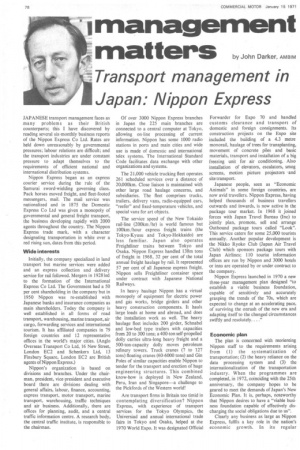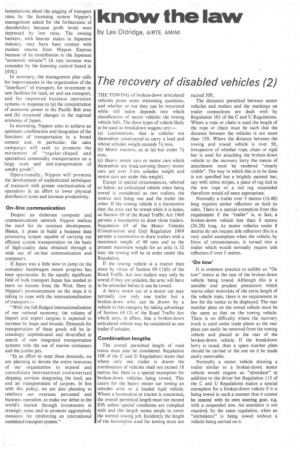'management
Page 82

Page 83

If you've noticed an error in this article please click here to report it so we can fix it.
matters by John Darker AM BIM --Transport management in
Japan: Nippon Express
JAPANESE transport management faces as many problems as their British counterparts; this I have discovered by reading several six-monthly business reports of the Nippon Express Co Ltd. Rates are held down unreasonably by governmental pressures; labour relations are difficult; and the transport industries are under constant pressure to adapt themselves to the requirements of efficient national and international distribution systems.
Nippon Express began as an express courier service during the rule of the Samurai sword-wielding governing class. Pack horses moved freight, and fleet-footed messengers, mail. The mail service was nationalized and in 1875 the Domestic Express Co Ltd was given a monopoly of governmental and general freight transport, the business developing rapidly with 2000 agents throughout the country. The Nippon Express trade mark, with a character designating transportation in white over a red rising sun, dates from this period.
Initially, the company specialized in land transport but marine services were added and an express collection and delivery service for rail followed. Mergers in 1928 led to the formation of the International Express Co Ltd. The Government had a 50 per cent shareholding in the company but in 1950 Nippon was re-established with Japanese banks and insurance companies as main shareholders. Today the company is well established in all forms of road transport, warehousing, marine transport, air cargo, forwarding services and international tourism. It has affiliated companies in 79 foreign countries and 12 representative offices in the world's major cities. (Anglo Overseas Transport Co Ltd, 16 New Street, London EC2 and Schenkers Ltd, 13 Finsbury Square, London EC2 are British agents of Nippon Express.) Nippon's organization is based on divisions and branches. Under the chairman, president, vice-president and executive board there are divisions dealing with general affairs, labour, finance, accounting, express transport, motor transport, marine transport, warehousing, traffic techniques and air business. Additionally, there are offices for planning, audit, and a central traffic information centre. A research body, the central traffic institute, is responsible to the chairman. Of over 3000 Nippon Express branches in Japan the 225 main branches are connected to a central computer at Tokyo, allowing on-line processing of current information. Nippon has some 1000 radio stations in ports and main cities and wide use is made of domestic and international telex systems. The International Standard Code facilitates data exchange with other organizations and systems.
The 21,000 vehicle trucking fleet operates 261 scheduled services over a distance of 20,000km. Close liaison is maintained with other large road haulage concerns, and subsidiaries. The fleet comprises trucks, trailers, delivery vans, radio-equipped cars, "reefer" and fixed-temperature vehicles, and special vans for art objects.
The service speed of the New Tokaido rail-line (200km /hr) is world famous but 100km /hour express freight trains (the Tokyo-Kyusu and Tokyo-Hokkaido) are less familiar. Japan also operates Freightliner trains between Tokyo and Osaka. Nippon Express handled 138m tons of freight in 1968, 32 per cent of the total annual freight haulage by rail. It represented 57 per cent of all Japanese express freight. Nippon sells Freightliner container space under contract with Japanese National Railways.
In heavy haulage Nippon has a virtual monopoly of equipment for electric power and gas works, bridge girders and other heavy construction components. It hauls large loads at home and abroad, and does the installation work as well. The heavy haulage fleet includes 200 girder, Schnabel and low-bed type trailers with capacities from 20 to 300 tons; a 400-ton self-propelled dolly carries ultra-long heavy freight and a 500-ton-capacity dolly moves petroleum refinery towers. Truck cranes (7 to 127 tons) floating cranes (60-6000 tons) and Gin Poles of similar capacities enable Nippon to tender for the transport and erection of huge engineering structures. This combined know-how is deployed in New Zealand, Peru, Iran and Singapore—a challenge to the Pickfords of the Western world!
Are transport firms in Britain too timid in contemplating diversification? Nippon Express, with experience of transport services for the Tokyo Olympics, the Universiad and annual international trade fairs in Tokyo and Osaka, helped at the 1970 World Expo. It was designated Official Forwarder for Expo 70 and handled customs clearance and transport of domestic and foreign consignments. Its construction projects on the Expo site included the building of a 4.3 metre monorail, haulage of trees for transplanting, movement of concrete piles and basic materials, transport and installation of a big freezing unit for air conditioning. Also installation of elevators, escalators, smog screens, motion picture projectors and site transport.
Japanese people, seen as "Economic Animals" in some foreign countries, are now avid travellers. Nippon Express, having helped thousands of business travellers outwards and inwards, is now active in the package tour market. In 1968 it joined forces with Japan Travel Bureau (Inc) to jointly plan, promote, sell and arrange Outbound package tours called "Look". This service caters for some 25,000 tourists annually. Another popular development is the Nikko Ryoko Club (Japan Air Travel Club) which sponsors package tours with Japan Airlines; 110 tourist information offices are run by Nippon and 3000 hotels or inns are operated by or under contract to the company.
Nippon Express launched in 1970 a new three-year management plan designed "to establish a viable business foundation, capable of sensitively and accurately grasping the trends of the 70s, which are expected to change at an accelerating pace, of surviving the onrush of the new era and adapting itself to the changed circumstances swiftly and resolutely...."
Economic plan
The plan is concerned with reorienting Nippon staff to the requirements arising from (1) the systematization of transportation; (2) the heavy reliance on the data processing system and (3) the internationalization of the transportation industry. When the programmes are completed, in 1972, coinciding with the 25th anniversary, the company hopes to be geared to meet the demands of Japan's New Economic Plan. It is, perhaps, noteworthy that Nippon desires to have a "viable business foundation capable of effectively discharging the social obligations due to us".
Clearly any business as large as Nippon Express, fulfils a key role in the nation's economic growth. In its regular lamentations about the pegging of transport rates by the licensing system Nippon's management asked for the forbearance of shareholders because profit levels were depressed by low rates. The owning bankers, with heavier stakes in Japanese industry, may have been content with modest returns from Nippon Express because of its contribution to the Japanese "economic miracle"! (A rate increase was conceded by the licensing control board in 1970.) In summary, the management plan calls for improvements in the organization of the "interfaces" of transport, for investment in new facilities for land, air and sea transport, and for improved business operation systems in response to (a) the concentration of economic power in the Pacific Belt area and (b) structural changes in the regional economy of Japan.
In marketing, Nippon aims to achieve an optimum combination and integration of the functions of transportation in a broad context and, in particular, the sales campaign will seek to promote the movement of "regular-shaped and specialized commodity transportation on a large scale and unit-transportation of sundry goods".
Operationally, Nippon will promote the development of sophisticated techniques of transport with greater mechanization of operations in an effort to lower physical distribution costsand increase productivity.
On -line communication Despite an elaborate computer and communications network Nippon realizes the need for its constant development. Hence, it plans to build a business data processing system capable of carrying out efficient system transportation on the basis of high-quality data obtained through a wide use of on-line communication and computers.
If Japan was a little slow to jump on the container bandwagon recent progress has been spectacular. In the equally significant field of bulk transport Japan has needed to learn no lessons from the West. Here is Nippon's pronouncement on the steps it is taking to cope with the internationalization of transport :— "With the full-fledged internationalization of our national economy, the volume of import and export cargoes is expected to increase by leaps and bounds. Demands for transportation of these goods will be increasingly sophisticated and diversified in search of new integrated transportation systems with the use of marine containers and the jumbo jets.
"In an effort to meet these demands, we are planning to devote the entire resources of our organization to expand and consolidate international containerized shipping services integrating the land, sea and air transportation of cargoes. In line with this policy, we are also planning to reinforce our overseas personnel and business operation, to make our debut in the world's market through investments in strategic areas and to promote aggressively measures for reinforcing an international combined transport system."




































































































































